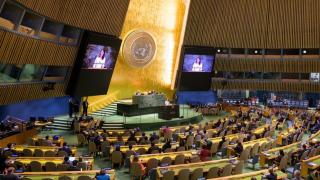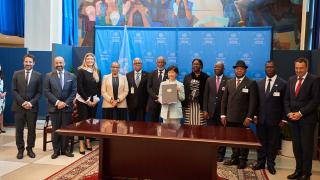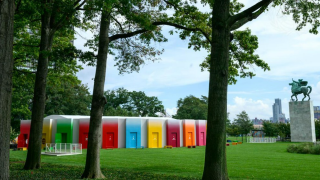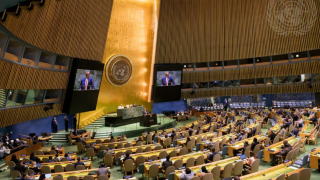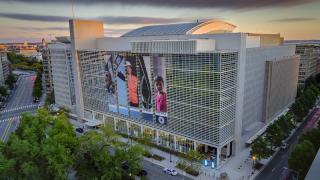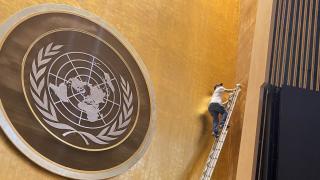
Monday 20 September marks the start of the UN General Assembly High-Level Week. An annual highlight in the diplomatic calendar, this year will see meetings on climate change (co-chaired by the UK Prime Minister), food systems and access to vaccines. The Secretary-General’s recent report on the future of multilateralism is also likely to be a topic of discussion.
With COVID-19 still raging and many parts of the world lacking access to vaccines, the occasion will again be a quieter affair - although a performance by superstars BTS will certainly draw attention. Recent developments - notably in Afghanistan and the Aukus agreement - meanwhile may impact what would have otherwise been a warm welcome for Joe Biden at his first appearance as US President.
In this briefing we provide some background on the General Assembly, as well as links to the timetable, key meetings and speakers’ lists. More analysis will be added in the coming days so watch this space.
What is UNGA?
The UN General Assembly (UNGA) is one of the main bodies of the United Nations. It is the only UN forum in which all members receive equal representation, and as such it is the main debating chamber of the UN.
It is also responsible for the UN’s budget, for the membership of the UN, and for electing and appointing other important roles within the UN, such as the members of the Human Rights Council, the non-permanent members of the UN Security Council and (in principle) the UN Secretary-General.
Unlike resolutions of the Security Council, resolutions of the General Assembly are non-binding on states but, as well as putting the thoughts of the world on record, they can be great motivators for action, particularly within the UN system: commissioning reports, finding funds and establishing offices and processes.
When does it meet?
The UN General Assembly meetings are divided into annual sessions which start every year in late September. The latest session, the 76th, began on 14 September. The sessions then run for almost a year.
However, the phrase UNGA is often used as a synecdoche for the “annual general debate” and sometimes the “high level plenary meeting” that take place in weeks 2 and 3 of the session. Week 2 is often referred to as “UNGA week” because this is when world leaders make speeches. In addition, important announcements and events involving high-profile participants such as CEOs and celebrities are timed to take place during this week. This year events, and appearances, will be held both in person and virtually.
One of the largest meetings of world leaders annually, UNGA week is an important part of the diplomatic calendar, providing ample opportunity for negotiations and discussions in the corridors of the UN headquarters. This year’s theme “Building resilience through hope – to recover from COVID-19, rebuild sustainably, respond to the needs of the planet, respect the rights of people and revitalize the United Nations” was chosen by the new President of the General Assembly, Abdulla Shahid of the Maldives. The theme is often broad in order to avoid constraining leaders’ speeches.
UNGA week tends to attract a lot of media attention, but the real work of UNGA takes place during the rest of the year, so we strive to support journalists and the public in continuing to follow the more substantive developments at the UN throughout the year.
Hybrid UNGA
After Covid-19 forced the 2020 General Assembly to go virtual for the first time in 75 years, UNGA76 is hoping to welcome around 100 heads of state and government, and foreign ministers to New York. However, as the world continues to grapple with Covid-19 and the threat of new variants, it is not quite business as usual.
While the UN Headquarters have remained largely closed over the last year, organisers have worked to negotiate and develop health guidelines that will enable a safe in-person General Assembly. In August the United States sent a letter to its fellow member states to urge them to stay away from New York and submit pre-recorded messages instead.
The UN’s Covid-19 vaccination honor system will remain in place, meaning that delegates will not need to show proof of vaccination in order to enter the General Assembly hall. Confirmation of this came on Thursday 16 September after the President of the General Assembly had earlier stated his “strong support” for vaccination proof in response to a letter sent from New York City Council. The letter sent ahead of high-level week mandated that the General Assembly hall was subject to the same rules as the wider city which currently requires proof of vaccination in order to enter certain indoor venues, including conference centres.
Plans to attempt to mandate vaccination proof were subsequently abandoned after Russia pushed back and the UN Secretary-General distanced himself from the proposal stating he “cannot tell a head of state if he is not vaccinated that he cannot enter the United Nations.” While the UN headquarters is in New York, it is international territory and not subject to US laws, officials have so far followed local guidance regarding Covid-19 measures.
Among those set to attend in person are US President Joe Biden, his first UNGA since being elected, UK Prime Minister Boris Johnson, Turkey’s President Recep Tayyip Erdogan and India’s Narendra Modi. Peru’s recently elected President Jose Pedro Castillo is set to attend, as well as Moldova’s Maia Sandu, the country’s first woman president.
Notable in-person absences will be China’s Xi Jinping and Russia’s Vladimir Putin, sending their deputy Prime Minister and Foreign Minister respectively in their place. Jacinda Ardern, New Zealand Prime Minister, and French President Emmanuel Macron will also not make the trip to New York.
The normally obscure UN Credentials Committee has also been in the spotlight, as questions were raised about who will represent Myanmar and Afghanistan in the General Assembly. The question of who will represent Myanmar at the UN has lingered since the military coup in February. It had been expected that the nine-member Credentials Committee would discuss the issue during UNGA and decide whether Kyaw Moe Tun, Myanmar’s Ambassador to the UN who is aligned with the overthrown government, would remain in post or if the military junta would be recognised. However, a recent deal reached between the US and China blocks the junta taking a place at the UN for now, and means the Credentials Committee will not make a decision on the issue until it meets in November.
The new Taliban government has so far not designated an alternative to the current Ambassador Ghulam M. Isaczai, who was appointed by former President Ashraf Ghani. However, questions are already being raised over whether a Taliban led government could be blocked from holding the seat. This piece in Just Security takes a look at the conditions under which the Taliban could be prevented from representing Afghanistan at the UN.
Each UNGA is important as it sets the agenda for global cooperation for the year ahead and provides an opportunity not only to take stock, but to reinvigorate multilateral processes and set new ambitions for the year ahead. The opening of the 76th session will have all eyes keenly focused on it as Covid-19 continues to rage, humanitarian and security concerns are on the rise, and the climate emergency looms large.
Timetable and Committees
The session started on Tuesday 14 September. The start of the session includes a moment of silent reflection, and an address from the Secretary-General and the new President of the General Assembly.
On Wednesday 15 September the General Assembly formed a General Committee consisting of the President, Vice Presidents, and committee chairs. They come up with a draft programme of work, which is then voted on by the General Assembly.
This programme of work divides up the tasks of the General Assembly between its main body and its six committees:
- The First Committee: Disarmament and International Security (DISEC)
- The Second Committee: Economic and Financial (ECOFIN)
- The Third Committee: Social, Cultural, and Humanitarian (SOCHUM)
- The Fourth Committee: Special Political and Decolonisation (SPECPOL)
- The Fifth Committee: Administrative and Budgetary and General
- The Sixth Committee: Legal
Each UN member can have a representative on each Committee. These Committees, led by their chairs, work up proposals which they present to the General Assembly for a vote. The President of the General Assembly, in consultation with the General Committee, is responsible for managing the workload of the whole.
On most issues, both within a committee and within the main or “plenary” session of the General Assembly, a simple majority vote of those in attendance is required, but some more substantive or important issues, such as admitting a state to UN membership, require a two-thirds majority.
Key events:
- 20 September - High-level meeting on climate co-chaired by the UK Prime Minister and UN Secretary-General. Informal closed-door discussions with around 30-40 heads of state will hope to break the current impasse on climate action ahead of COP26 in Glasgow later this year.
- 20 September - SDG Moment, the second of the Decade for Action, will seek to reinforce the 2030 Agenda and report on progress, highlight urgent action to ensure Covid-19 response and recovery is fair and just, and demonstrate that large scale action and transformation is possible.
- 22 September - High-level meeting to commemorate the 20th Anniversary of the adoption of the Durban Declaration and Programme of Action.
- 21 September - High-level event on elimination of VAW and Girls - women in conflict hosted by the European Union, UN Women and Dr. Denis Mukwege Foundation.
- 23 September - UN Food systems summit will be a historic opportunity to empower people to leverage the power of food systems as we recover from Covid-19 and get the world back on track to achieve the 2030 Agenda.
- 23 September - Special UN Security Council debate on climate and security at the head of state level could be an important moment for momentum ahead of COP26
- 24 September - High-level dialogue on energy will be the first global gathering on energy under the auspices of UNGA since 1981. The aim is to raise ambition and accelerate action towards energy targets of SDG7.
- 28 September - High-level plenary meeting to commemorate and promote the International Day for the Total Elimination of Nuclear Weapons.
You can find a comprehensive list of all the meetings taking place here.
To follow the up-to-date schedule of daily meetings, check out the UN Journal, which is updated every morning. It contains information on the meetings of the day and forthcoming meetings, including:
- Official meetings (summaries will be added after the meetings, where applicable)
- Informal consultations
- Other meetings
- Forthcoming meetings
Also don’t miss the UN delegates handbook that gives an overview for participants in UNGA of the ways the UN is encouraging UNGA interactivity.
The order of speakers for the General Debate can be found here.
By tradition Brazil goes first (Brazil’s delegates were very effective in the very first few General Assembly sessions in getting to the podium first, and the tradition stuck!). Then, as host, the US goes second. After that, speaker order is by negotiation, but Heads of State (Presidents and Kings) tend to go first, followed by heads of government (Prime Ministers) followed by Foreign Ministers, followed by other diplomats. Last year the first woman to speak was 52nd on the running order. This year Zuzana Čaputová of Slovakia will be the first woman to speak at number 6 on the roster.
First five speakers of day one:
- Jair Bolsonaro, Brazil
- Joe Biden, USA
- Ibrahim Mohamed Solih, Maldives
- Iván Duque Márquez, Colombia
- Tamim bin Hamad Al Thani, Qatar
What's on the Agenda
Click here to see what's on the agenda during UNGA76, including vaccine equity, climate action and the future of multilateralism.
Photo: UN Staff prepare UN HQ in New York ahead of the 76th Session of the UN General Assembly. Credit: UN Photo

